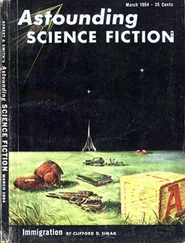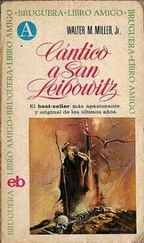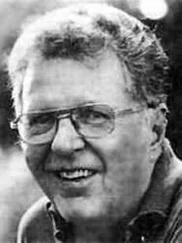Tonight, however, the gnawing of hunger was less troublesome to Francis than his own impatient urge to run back to the abbey and announce the news of his discovery. To do so would be to renounce his vocation no sooner than it had come to him; he was here for the duration of Lent, vocation or no vocation, to continue his vigil as if nothing extraordinary had occurred.
Dreamily, from near the fire, he gazed into the darkness in the direction of Fallout Survival Shelter and tried to visualize a towering basilica rising from the site. The fantasy was pleasant, but it was difficult to imagine anyone choosing this remote stretch of desert as the focal point of a future diocese. If not a basilica, then a smaller church — The Church of Saint Leibowitz of the Wilderness — surrounded by a garden and a wall, with a shrine of the Saint attracting rivers of pilgrims with girded loins out of the north. “Father” Francis of Utah conducted the pilgrims on a tour of the ruins, even through “Hatch Two” into the splendors of “Sealed Environment” beyond, the catacombs of the Flame Deluge where… where… well, afterwards, he would offer Mass for them on the altar stone which enclosed a relic of the church’s name-saint — a bit of burlap? fibers from the hangman’s noose? fingernail clippings from the bottom of the rusty box? — or perhaps RACING FORM. But the fantasy withered. The chances of Brother Francis becoming a priest were slight — not being a missionary Order, the Brothers of Leibowitz needed only enough priests for the abbey itself and a few smaller communities of monks in other locations. Furthermore, the “Saint” was still only a Beatus officially, and would never be formally declared a saint unless he wrought a few more good solid miracles to underwrite his own beatification, which was not an infallible proclamation, as canonization would be, although it permitted the monks of the Leibowitz Order formally to venerate their founder and patron, outside of the Mass and the Office. The proportions of the fantasy church dwindled to the size of a wayside shrine; the river of pilgrims shrank to a trickle. New Rome was busy with other matters, such as the petition for a formal definition on the question of the Preternatural Gifts of the Holy Virgin, the Dominicans holding that the Immaculate Conception implied not only indwelling grace, but also that the Blessed Mother had had the preternatural powers which were Eve’s before the Fall; some theologians of other Orders, while admitting this to be pious conjecture, denied that it was necessarily the case, and contended that a “creature” might be “originally innocent” but not endowed with preternatural gifts. The Dominicans bowed to this, but contended that the belief had always been implicit in other dogma — such as the Assumption (preternatural immortality) and the Preservation from Actual Sin (implying preternatural integrity) and still other examples. While attempting to settle this dispute, New Rome had seemingly left the case for the canonization of Leibowitz to gather dust on the shelf.
Contenting himself with a small shrine of the Beatus and a casual trickle of pilgrims, Brother Francis drowsed. When he awoke, the fire was reduced to glowing embers. Something seemed amiss. Was he quite alone? He blinked around at the encompassing darkness.
From beyond the bed of reddish coals, the dark wolf blinked back.
The novice yelped and dived for cover.
The yelp, he decided as he lay trembling within his den of stones and brush, had been only an involuntary breach of the rule of silence. He lay hugging the metal box and praying that the days of Lent might pass swiftly, while padded feet scratched about his enclosure.
“…and then, father, i almost took the bread and cheese.”
“But you didn’t take it?”
“No.”
“Then there was no sin by deed.”
“But I wanted it so badly, I could taste it.”
“Willfully? Did you deliberately enjoy the fantasy?”
“No.”
“You tried to get rid of it.”
“Yes.”
“So there was not culpable gluttony of thought either. Why are you confessing this?”
“Because then I lost my temper and splashed him with holy water.”
“You what? Why?”
Father Cheroki, wearing his stole, stared at the penitent who knelt in profile before him in the scorching sunlight on the open desert; the priest kept wondering how it was possible for such a youth (not particularly intelligent insofar as he could determine) to manage to find occasions or near-occasions of sin while completely isolated on barren desert, far from any distraction or apparent source of temptation. There should be very little trouble a boy could get into out here, armed as he was with only a rosary, a flint, a penknife, and a prayerbook. So it seemed to Father Cheroki. But this confession was taking up quite a lot of time; he wished the boy would get on with it. His arthritis was bothering him again, but because of the presence of the Holy Sacrament on the portable table which he took with him on his rounds, the priest preferred to stand, or to stay on his knees along with the penitent. He had lighted a candle before the small golden case which contained the Hosts, but the flame was invisible in the sun-glare, and the breeze might even have blown it out.
“But exorcism is permissible these days, without any specific higher authorization. What are you confessing — being angry?”
“That too.”
“At whom did you become angry? At the old man — or at yourself for almost taking the food?”
“I — I’m not sure.”
“Well, make up your mind,” Father Cheroki said impatiently. “Either accuse yourself, or else not.”
“I accuse myself.”
“Of what?” Cheroki sighed.
“Of abusing a sacramental in a fit of temper.”
“ ‘Abusing’? You had no rational reason to suspect diabolic influence? You just became angry and squirted him with it? Like throwing the ink in his eye?”
The novice squirmed and hesitated, sensing the priest’s sarcasm. Confession was always difficult for Brother Francis. He could never find the right words for his misdeeds, and in trying to remember his own motives, he became hopelessly confused. Nor was the priest helping matters by taking the “either-you-did-or-else-you-didn’t” stand — even though, obviously, either Francis had or else he hadn’t.
“I think I lost my senses for a moment,” he said finally.
Cheroki opened his mouth, apparently meaning to pursue the matter, then thought better of it. “I see. What next then?”
“Gluttonous thoughts,” Francis said after a moment.
The priest sighed. “I thought we were through with that. Or is this another time?”
“Yesterday. There was this lizard, Father. It had blue and yellow stripes, and such magnificent hams — thick as your thumb and plump, and I kept thinking how it would taste like chicken, roasted all brown and crisp outside, and—”
“All right,” the priest interrupted. Only a hint of revulsion crossed his aged face. After all, the boy was spending a lot of time in the sun. “You took pleasure in these thoughts? You didn’t try to get rid of the temptation?”
Francis reddened. “I — I tried to catch it. It got away.”
“So, not merely thought — deed as well. Just that one time?”
“Well-yes, just that.”
“All right, in thought and deed, willfully meaning to eat meat during Lent. Please be as specific as you can after this. I thought you had examined your conscience properly. Is there anything else?’
“Quite a lot.”
The priest winced. He had several hermitages to visit; it was a long hot ride, and his knees were hurting. Please get on with it as quickly as you can,” he sighed.
Читать дальше








